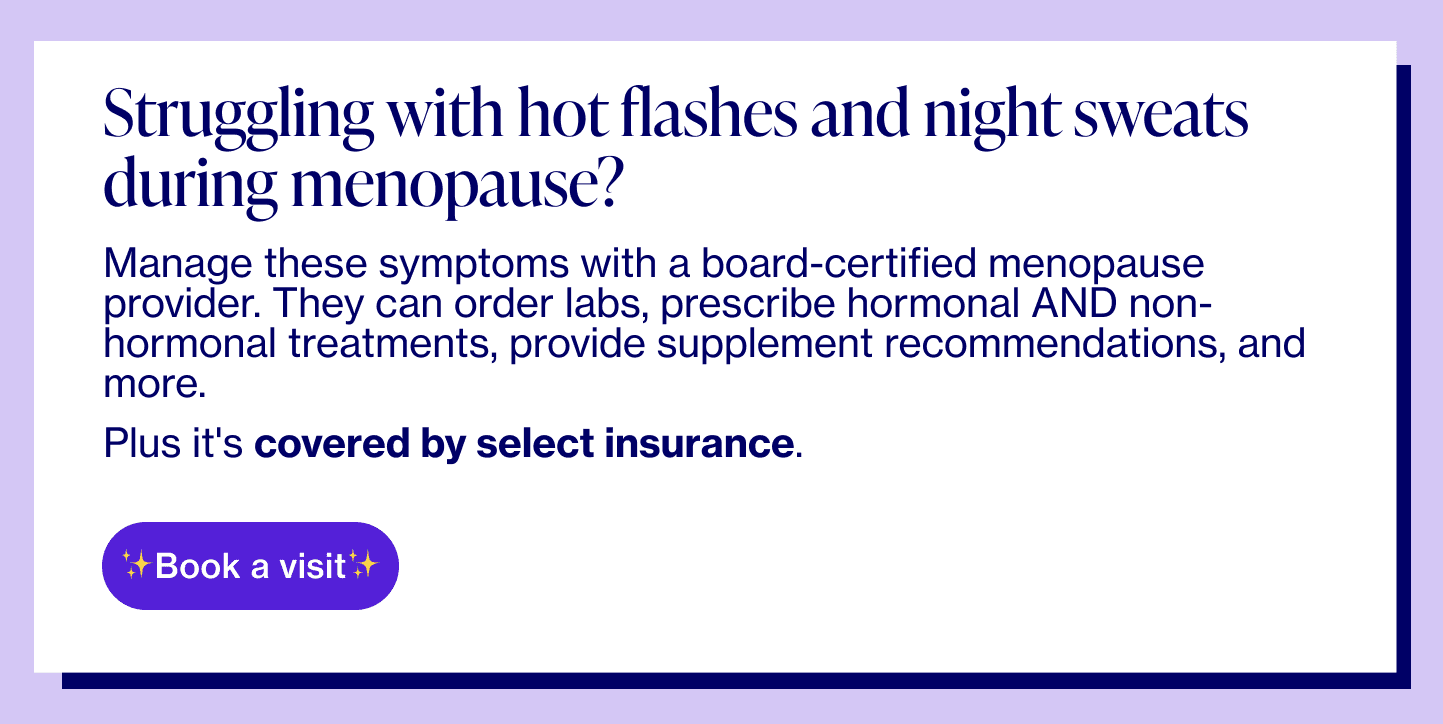
Published on Feb 28, 2023
Last modified on Apr 08, 2025
Is Soy Safe & Effective For Menopausal Women? Here’s What The Science Says
5 min read
Soy — also known as soybean or soya bean — is a type of legume native to East Asia that most people recognize in the form of edamame, tofu, tempeh, tamari, miso, soy nuts, and soy milk/cheese. Its nutritional claim to fame is, for the most part, in the protein department. With all nine essential amino acids, soy is what’s known as a “complete protein” with 100 grams of cooked green soybeans containing 12.25 grams of protein.
When it comes to the effectiveness of soy for relieving menopause symptoms, there’s been a whole lot of conflicting studies…and confusion.
Case in point: certain randomized controlled trials have shown that soy IS effective for menopause symptom relief. The reason? It’s a phytoestrogen, aka a plant-based compound that, at the molecular level, is similar to that of estrogen. It mimics the role of this key hormone in the body, thus helping with hormonal fluctuations.
However, other scientific literature states that although soy is made of isoflavone compounds (genistein and daidzein) — which are a type of plant-based estrogen — it is different from the estrogen found naturally in our bodies. And while this statement was made to support the claim that plant-based estrogen may not drive breast cancer growth in the same way that our own estrogen may (more on that below), it still begs the question…if estrogen from soy products is indeed different than our body’s estrogen, what does this mean for the role of soy isoflavones on other menopause symptoms like hot flashes/night sweats, heart health, and more?
Below, we’re breaking down what we know and don’t know to date about the beneficial effects of soy consumption for menopausal and postmenopausal women.
The science on soy & vasomotor symptoms (hot flashes/night sweats)
Although the causes of hot flashes aren’t yet fully understood, evidence points to hormonal fluctuations. When estrogen levels drop, the hypothalamus (which acts as our body’s thermostat) becomes more sensitive to slight changes in body temperature. Thinking it’s overheated, the hypothalamus starts working to cool the body by shunting blood away from the core to your skin, which kick-starts a chain of events causing flushing, sweating, and an internal sensation of heat despite the fact that our body temperature isn’t actually rising.
The benefits of soy foods on the quantity and severity of hot flashes have been extensively studied, with a 2021 women’s health study published by the North American Menopause Society (NAMS) finding that a plant-based, soy-rich diet reduces moderate to severe hot flashes by up to 84%, from five per day to fewer than one per day. And get this: throughout the course of the three-month study, overall hot flashes among all participants decreased by 79%.
Although the sample size of this study was too small to draw definitive claims, researchers have seen similar promising results in larger randomized, placebo-controlled clinical trials.
READ MORE:
- Elektra’s Full Guide To Hot Flashes & Night Sweats
- There’s A New Non-Hormonal Treatment For Hot Flashes
The science on soy & cholesterol
Women are at a higher risk for cardiovascular disease, aka heart disease, during postmenopausal years due to declining estrogen levels. And while there are a range of contributing factors (age, family history, high blood pressure, smoking, activity levels, diabetes, etc), dietary interventions have proven particularly effective, with soybeans having been shown to lower triglycerides as well as total and LDL cholesterol.
- Triglycerides: a type of fat that circulates in the blood, which we need a little of but don’t want too much of
- LDL (low-density lipoprotein) cholesterol: the “bad” cholesterol that raises the risk for heart disease and stroke
Does this mean that soy-based foods are a cure-all for heart health? Unfortunately, no (if only!). And it should also be noted that this study just looked at 19 of the over 2500 varieties of soybeans — and was conducted in a lab, not on humans. But it IS safe to say that soy is a heart-healthy food for everyone, whether perimenopausal or postmenopausal.
The science on soy & bone health
Unlike some other menopausal symptoms, the science behind bone loss is fairly simple: estrogen protects our bones, so when estrogen levels decrease during menopause, so too does bone density. This can lead to osteopenia (an official term for low bone density) and osteoporosis (a disease caused by significant bone loss).
Because menopause is the most common cause of osteoporosis, hormone replacement therapy (HRT) — and in particular estrogen therapy — is the most common cause of prevention and treatment. That said, there’s been some buzz lately about the role that soy can play as well.
The thing is…while the science behind menopausal bone loss is fairly simple, the relationship between soy phytoestrogens and bone health isn’t.
Several studies have examined the relationship between soy foods, soy protein isolates, and isoflavone extracts on osteoporosis prevention and overall bone health. And while many findings have been positive, they haven’t been conclusive enough to warrant definitive recommendations for treatment — particularly because of the differences in study design:
- The studies vary in length from 4 – 24 months
- Studies utilize different “active ingredients,” including soy protein powder, soy milk, mixed isoflavones, and individual isoflavones
- Studies utilize different dosages from 4.4 mg/day – 118 mg/day
The bottom line: there is preliminary research that soy foods are associated with improved markers of bone health, especially among Asian women. That said, more research is needed to fully understand the optimal amounts and types of soy foods that yield these beneficial effects as part of a whole foods, plant-based diet.
READ MORE:
Interested in adding more soy products to your diet?
Start with 1 serving per day, which equates to:
- 1 cup soy milk
Perfect in smoothies, coffee, cereal, or baked goods. - 1/2 cup edamame or tofu
Edamame is the perfect snack or protein-packed addition to a salad while tofu is ideal for stir-fries.
What to keep in mind:
- We recommend choosing organic soy whenever possible, as conventionally-produced soy often comes from large farms with high pesticide and chemical use.
- While whole soybeans may not be optimal for those of us with autoimmune conditions, soy isoflavone supplementation is still still a viable option.
- You should, of course, not consume soy if allergic as doing so may cause inflammation.
Here are some soy-based recipes we love:
- Jade Noodles – This veggie-packed cold noodle dish with tofu is perfect for picnics, lunches, or summer barbecues.
- Soy Ginger Salmon – Get your Omega-3s and protein in with this simple but flavorful salmon recipe.
- Sesame Noodles with Crispy Tofu – The crispy tofu is really the star of the show in this warm, umami noodle dish.
- Marinated Peanut Tempeh – If you’ve never had tempeh, this is your sign to try it. The peanut sauce in this recipe pairs perfectly with the already nutty taste of tempeh, which is made of packed, fermented soybeans.
READ MORE:
- 5 Non-Hormonal Treatments For Hot Flashes
- Ward Off Hot Flashes With These Simple Ingredients
- Elektra’s Guide To Nutrition During The Menopause Transition
- Is Keto Safe & Effective For Menopause?
- Fiber and Menopause: Here’s What to Know
- Mediterranean Diet During Menopause: Benefits, Tips, Recipes & More



